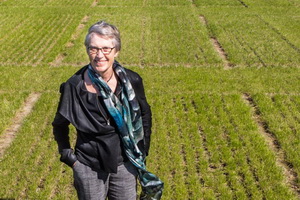
UC Professor Emerita Emphasizes on Gene Editing to Achieve Sustainability Needs
May 22, 2019| |
 University of Canterbury's (UC) newest Professor Emerita Paula Jameson has spoken about how important it is to consider gene editing as a tool to improve crop production to meet the sustainability demands of New Zealand. A UC alumna who holds double majors in plant physiology and chemistry and a PhD on wheat and cytokinins, Prof. Jameson sees gene editing as one technique that has a lot of potential to achieve the Aotearoa New Zealand's targets towards zero carbon in its agronomic systems.
University of Canterbury's (UC) newest Professor Emerita Paula Jameson has spoken about how important it is to consider gene editing as a tool to improve crop production to meet the sustainability demands of New Zealand. A UC alumna who holds double majors in plant physiology and chemistry and a PhD on wheat and cytokinins, Prof. Jameson sees gene editing as one technique that has a lot of potential to achieve the Aotearoa New Zealand's targets towards zero carbon in its agronomic systems.
Citing genetic engineering, Prof. Jameson said that genetically engineered products have been around for well over a decade. The technology is not hardly new nor untested. While it is true that genetically engineered plants are not planted in New Zealand, the public has been consuming genetically engineered products like soybean and canola for years. This is when Prof. Jameson appeals to consider looking into gene-edited plants. She stressed how Aotearoa New Zealand legislation needs to accept gene editing as a problem-solving tool that does not need the same level of regulatory oversight that is required for plant genetic engineering, as in the case of other countries like the US and Canada.
Prof. Jameson then proceeds to explain that with gene editing, scientists can single out one gene and alter it very accurately. Instead of relying on natural mutations through traditional breeding techniques, gene editing can mimic these mutations in different cultivars. Moreover, using gene editing takes less time for the final product to come out and with accurate precision. She urges Aotearoa New Zealanders to become more aware of the benefits of gene editing, because gene-edited plants have more potential to increase yield and fight off environmental stress to help achieve New Zealand's sustainability targets.
Read more from University of Canterbury news.
| |
Biotech Updates is a weekly newsletter of ISAAA, a not-for-profit organization. It is distributed for free to over 22,000 subscribers worldwide to inform them about the key developments in biosciences, especially in biotechnology. Your support will help us in our mission to feed the world with knowledge. You can help by donating as little as $10.
-
See more articles:
-
News from Around the World
- University of Michigan Puts Spotlight on Smarter Food Systems to Attain Zero Hunger
- Ethiopian Women in Biosciences Trained on Science Communication
- Software Locates Sugarcane Genes of Interest
- Scientists Use Open-Source Genetic Analysis Method in Plant Cells for the First Time
- Technology to Measure Plant Improvements Helps Boost Production
- US to Help Pakistan Introduce GE Corn
- UC Professor Emerita Emphasizes on Gene Editing to Achieve Sustainability Needs
- Scientists Discover RNA Controlling Tuber Formation in Potatoes
- Iron-rich GM Wheat Set to Undergo Field Trials
-
Research Highlights
- Sweetpotato Enzymes Expressed in Arabidopsis Revealed Additional Functions of VEPs
- Research Shows How Transposon Insertion Confers Resistance to Bt Cotton in Pink Bollworm
-
Beyond Crop Biotech
- Scientists Sequence Charleston Gray Watermelon
-
Plant
- Experts Use CRISPR-Cpf1 for Cotton Genome Editing
- Successful Deletion of Rice Retrotransposon Using CRISPR-Cas9
-
Read the latest: - Biotech Updates (December 17, 2025)
- Gene Editing Supplement (December 17, 2025)
- Gene Drive Supplement (February 22, 2023)
-
Subscribe to BU: - Share
- Tweet
